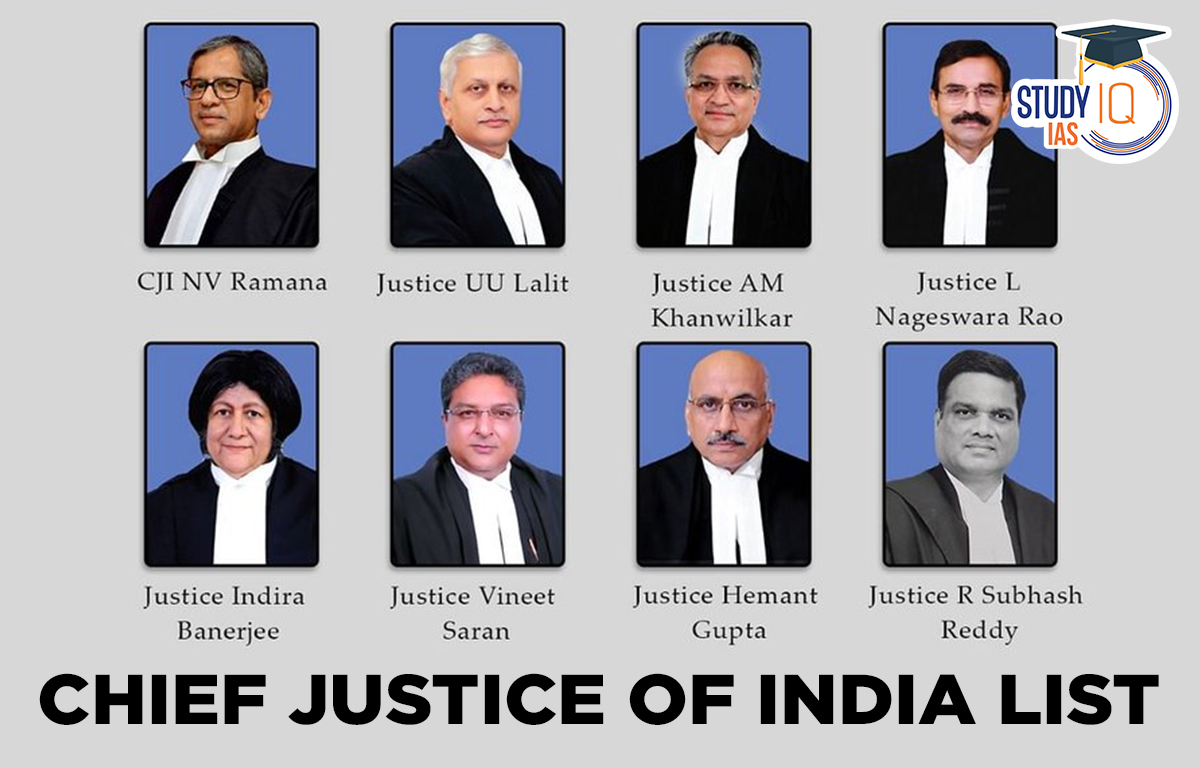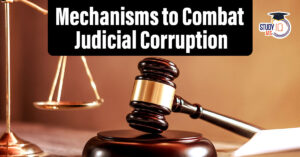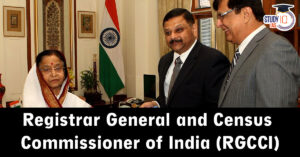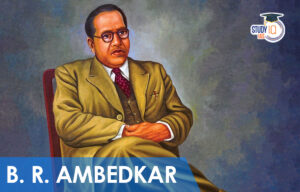Table of Contents
The Chief Justice of India (CJI) is the head of the Supreme Court, the highest judicial body in the country, and presides over the Indian judiciary system. Since its inception on January 26, 1950, the Supreme Court of India has had 50 Chief Justices who have contributed significantly to shaping the nation’s legal and constitutional landscape. Justice D.Y. Chandrachud, who took office as the 50th CJI, retired in November 2024, following which Justice Sanjiv Khanna assumed office as the 51st CJI. This article will provide a detailed look at the Chief Justices of India from 1950 to 2024, the role of the CJI, key challenges faced by the judiciary, and landmark rulings that have shaped the Indian legal system.
Justice Sanjiv Khanna 51st Chief Justice of India
The President of India appointed Justice Sanjiv Khanna as the Chief Justice of India, effective November 11, 2024. This appointment is by clause (2) of Article 124 of the Indian Constitution, which empowers the President to appoint judges to the Supreme Court, including the Chief Justice of India. Justice Khanna, who is currently a judge of the Supreme Court of India, will assume this esteemed role following the retirement of the current Chief Justice.
Justice Khanna is recognized for his contributions to the judiciary, including his rulings on constitutional law, human rights, and public interest litigation. Justice Sanjiv Khanna succeeds Justice D.Y. Chandrachud, whose term as the CJI concluded, allowing Justice Khanna to take on the role. As the head of the judiciary and a prominent member of the Supreme Court, the Chief Justice of India holds a significant position, overseeing judicial administration and ensuring the smooth functioning of India’s judicial system.
Also Read: Appointment of Chief Justice of India
Chief Justice of India List From 1950-2024
Look at the table below to see a list of every Supreme Court judge since independence. The Chief Justice of India List Name, their term, high courts, and Presidents they worked for are listed in the following table for the contenders.
| Name | Tenure | High Court | President |
|---|---|---|---|
| Harilal Jekisundas Kania | 26th January 1950 To 6th November 1951 | Bombay High Court | Rajendra Prasad |
| Mandakolathur Patanjali Sastri | 7th November 1951 To 3rd January 1954 | Madras High Court | Rajendra Prasad |
| Mehr Chand Mahajan | 4th January 1954 To 22 December 1954 | Lahore High Court | Rajendra Prasad |
| Bijan Kumar Mukherjea | 23rd December 1954 To 31st January 1956 | Calcutta High Court | Rajendra Prasad |
| Sudhi Ranjan Das | 1st February 1956 To 30th September 1959 | Calcutta High Court | Rajendra Prasad |
| Bhuvaneshwar Prasad Sinha | 1st October 1959 To 31st January 1964 | Patna High Court | Rajendra Prasad |
| Pralhad Balacharya Gajendragadkar | 1st February 1964 To 15th March 1966 | Bombay High Court | Sarvepalli Radhakrishnan |
| Amal Kumar Sarkar | 16th March 1966 To 29th June 1966 | Calcutta High Court | Sarvepalli Radhakrishnan |
| Koka Subba Rao | 30th June 1966 To 11th April 1967 | Madras High Court | Sarvepalli Radhakrishnan |
| Kailas Nath Wanchoo | 12th April 1967 To 24th February 1968 | Allahabad High Court | Sarvepalli Radhakrishnan |
| Mohammad Hidayatullah | 25th February 1968 To 16th December 1970 | Bombay High Court | Zakir Husain |
| Jayantilal Chhotalal Shah | 17th December 1970 To 21st January 1971 | Bombay High Court | V. V. Giri |
| Sarv Mittra Sikri | 22nd January 1971 To 25th April 1973 | Lahore High Court | V. V. Giri |
| Ajit Nath Ray | 26th April 1973 To 27th January 1977 | Calcutta High Court | V. V. Giri |
| Mirza Hameedullah Beg | 29th January 1977 To 21st February 1978 | Allahabad High Court | Fakhruddin Ali Ahmed |
| Yeshwant Vishnu Chandrachud | 22nd February 1978 To 11th July 1985 | Bombay High Court | Neelam Sanjiva Reddy |
| Prafullachandra Natwarlal Bhagwati | 12th July 1985 To 20th December 1986 | Gujarat High Court | Zail Singh |
| Raghunandan Swarup Pathak | 21st December 1986 To 18th June 1989 | Allahabad High Court | Zail Singh |
| E. S. Venkataramiah | 19th June 1989 To 17th December 1989 | Karnataka High Court | Ramaswamy Venkataraman |
| Sabyasachi Mukharji | 18th December 1989 To 25th September 1990 | Calcutta High Court | Ramaswamy Venkataraman |
| Ranganath Misra | 26th September 1990 To 24th November 1991 | Orissa High Court | Ramaswamy Venkataraman |
| Kamal Narain Singh | 25th November 1991 To 12th December 1991 | Allahabad High Court | Ramaswamy Venkataraman |
| Madhukar Hiralal Kania | 13th December 1991 To 17th November 1992 | Bombay High Court | Ramaswamy Venkataraman |
| Lalit Mohan Sharma | 18th November 1992 To 11th February 1993 | Patna High Court | Shankar Dayal Sharma |
| M. N. Rao Venkatachaliah | 12th February 1993 To 24th October 1994 | Karnataka High Court | Shankar Dayal Sharma |
| Aziz Mushabber Ahmadi | 25th October 1994 To 24th March 1997 | Gujarat High Court | Shankar Dayal Sharma |
| Jagdish Sharan Verma | 25th March 1997 To 17th January 1998 | Madhya Pradesh High Court | Shankar Dayal Sharma |
| Madan Mohan Punchhi | 18th January 1998 To 9th October 1998 | Punjab and Haryana High Court | K. R. Narayanan |
| Adarsh Sein Anand | 10th October 1998 To 31st October 2001 | Jammu and Kashmir High Court | K. R. Narayanan |
| Sam Piroj Bharucha | 1st November 2001 To 5th May 2002 | Bombay High Court | K. R. Narayanan |
| Bhupinder Nath Kirpal | 6th May 2002 To 7th November 2002 | Delhi High Court | K. R. Narayanan |
| Gopal Ballav Pattanaik | 8th November 2002 To 18th December 2002 | Orissa High Court | A. P. J. Abdul Kalam |
| Vishweshwar Nath Khare | 19th December 2002 To 1st May 2004 | Allahabad High Court | A. P. J. Abdul Kalam |
| S. Rajendra Babu | 2nd May 2004 To 31st May 2004 | Karnataka High Court | A. P. J. Abdul Kalam |
| Ramesh Chandra Lahoti | 1st June 2004 To 31st October 2005 | Madhya Pradesh High Court | A. P. J. Abdul Kalam |
| Yogesh Kumar Sabharwal | 1st November 2005 To 13th January 2007 | Delhi High Court | A. P. J. Abdul Kalam |
| K. G. Balakrishnan | 14th January 2007 To 12th May 2010 | Kerala High Court | A. P. J. Abdul Kalam |
| Sarosh Homi Kapadia | 12th May 2010 To 28th September 2012 | Bombay High Court | Pratibha Patil |
| Altamas Kabir | 29th September 2012 To 18th July 2013 | Calcutta High Court | Pranab Mukherjee |
| P. Sathasivam | 19th July 2013 to 26th April 2014 | Madras High Court | Pranab Mukherjee |
| Rajendra Mal Lodha | 27th April 2014 To 27th September 2014 | Rajasthan High Court | Pranab Mukherjee |
| Handyala Lakshminarayanaswamy Dattu | 28th September 2014 To 2nd December 2015 | Karnataka High Court | Pranab Mukherjee |
| Tirath Singh Thakur | 3rd December 2015 To 3rd January 2017 | Jammu and Kashmir High Court | Pranab Mukherjee |
| Jagdish Singh Khehar | 4th January 2017 To 27th August 2017 | Punjab and Haryana High Court | Pranab Mukherjee |
| Dipak Misra | 28th August 2017 To 2nd October 2018 | Orissa High Court | Ram Nath Kovind |
| Ranjan Gogoi | 3rd October 2018 To 17th November 2019 | Guwahati High Court | Ram Nath Kovind |
| Sharad Arvind Bobde | 18th November 2019 To 23rd April 2021 | Bombay High Court | Ram Nath Kovind |
| Nuthalapati Venkata Ramana | 24th April 2021 To 26th August 2022 | Andhra Pradesh High Court | Ram Nath Kovind |
| Uday Umesh Lalit | 27 August 2022 To November 8, 2022 | Bar Council | Droupadi Murmu |
| Justice Dhananjaya Y. Chandrachud | 9th November 2022 To November 10th 2024 | Bombay High Court | Droupadi Murmu |
| Justice Sanjiv Khanna | 11th November 2024 To Present | Delhi High Court | Droupadi Murmu |
Who is the Chief Justice of India?
The Supreme Court of India and the Indian judicial system are led by India’s Chief Justice. In other terms, the Chief Justice of India (CJI) is the highest-ranked official in the Indian legal system. The President selects the Chief Justice of India from the bench of Supreme Court judges based on their seniority. The CJI ensures that the Supreme Court continues to operate properly, including through the assignment of cases, roster maintenance, and other tasks.
First Chief Justice of Supreme Court
Sir Harilal Jekisondas Kania, the first Chief Justice of India, was born on November 3, 1890, in Surat, Gujarat who served from November 2, 1958, to January 26, 1961, and was succeeded by Justice M. Patanjali Sastri, who served from January 26, 1964, to January 3, 1954. His father was a Sanskrit professor and principal of Samaldas College.
Justice Kania graduated with a BA from Samaldas College in 1910 and earned his LLB and LLM from Government Law College, Bombay, in 1912 and 1913. He started practising at the Bombay High Court in 1915, often alongside his brother, Hirajlal. In 1987, Hirajlal’s son, M.H. Kania, also became a Supreme Court judge. Early in his career, Justice Kania worked as Acting Editor for Indian Law Reports.
First Woman Chief Justice of India
Ms Justice M. Fathima Beevi was born on April 30, 1927, in Pathanamthitta, Kerala. Her father was Mr Meera Sahib, and she lived with her mother, Khadeeja Bibi. She attended Catholicate High School in Pathanamthitta and later earned a B.Sc. from University College, Trivandrum, and a law degree from Law College, Trivandrum.
She became an advocate on November 14, 1950. In May 1958, she was appointed as a Munsiff in the Kerala Subordinate Judicial Services and was promoted to various positions: Subordinate Judge in 1968, Chief Judicial Magistrate in 1972, and District & Sessions Judge in 1974. In January 1980, she became a Judicial Member of the Income Tax Appellate Tribunal.
She was elevated to the High Court as a judge on August 4, 1983, and became a permanent judge on March 14, 1984. She retired from the High Court on April 29, 1989, and then became a judge in the Supreme Court on October 6, 1989, retiring on April 29, 1992.
Chief Justice of India Salary
Chief Justice of India has the highest salary of INR 2,80,000 per month. The Chief Justice also has the highest pension of INR 16,80,000 per annum, plus a gratuity of INR 20,00,000.
Chief Justice of India Salary:-
- Salary: INR 2,80,000 per month
- Pension: INR 16,80,000 per annum + INR 20,00,000 gratuity
Role and Responsibilities of the Chief Justice of India
The Chief Justice of India has a multifaceted role:
- Judicial Duties: Presides over Supreme Court proceedings, allocates cases, and leads the Constitutional bench.
- Administrative Duties: Manages court operations, appoints new judges, and oversees court staff.
- Constitutional Advisor: Advises the President on judicial matters and upholds constitutional values.
| Related Articles |
| Collegium System |
| Judicial Appointment Reforms in India |


 Mechanisms to Combat Judicial Corruption...
Mechanisms to Combat Judicial Corruption...
 Registrar General and Census Commissione...
Registrar General and Census Commissione...
 Ambedkar Jayanti 2025: Biography, Legacy...
Ambedkar Jayanti 2025: Biography, Legacy...





















